Event Report on Female + Film: Women: Their voices, and the stories we shared

Reported by Yuqing Wang (Class of 2025)
On the evening of May 7th, we gathered at the second-floor screening room of the DKU Library to watch the documentary Woman. Directed by Anastasia Mikova and Yann Arthus-Bertrand, this film doesn’t follow a traditional narrative—it offers no commentary or storyline. Instead, it invites 2,000 women from over 50 countries to simply face the camera and speak. About childhood. About motherhood. About freedom, violence, identity, and dreams. Each story uninterrupted. Every silence respected.


Throughout the hour-long screening, the room remained still. We sat quietly, watching the screen fill with women’s faces—some firm, some tired, some smiling, and some in tears. They spoke of loss, of resilience, of love and anger. Their words felt raw and unfiltered, and at the same time, incredibly gentle. No one whispered. No one moved. But eyes turned red, and heads bowed low in thought. Something deep was settling in the room.
After the film, a few students stayed for discussion, but everyone’s face showed reflection. There weren’t many words—but the shared silence felt heavy and warm. It was the kind of moment where we didn’t need to explain—we simply understood.
Woman wasn’t made to teach or convince. It was made so we could see—see women’s bodies, their emotions, their fears and desires, how they’ve survived in pain, and how they’ve quietly, stubbornly lived on. What lingers most are perhaps those ordinary women’s eyes—honest, direct, and unapologetic.

In a time when everything is fast, scattered, and constantly “explained,” we still need these spaces of quiet witnessing. We still need stories that are simply told.
This wasn’t just a film about them. It was—quietly and completely—about us.
Event Report: Unnatural Rain: Legitimizing Weather Modification in the Cold War U.S.
Archives and History Initiative, by Disty Mahmud ‘26 and Yuruo Zhang ‘27
On April 30th, the Archives and History Initiative hosted Professor Joseph Giacomelli, who presented on his research paper, Unnatural Rain: Legitimizing Weather Modification in the Cold War U.S. The talk explored how weather modification, especially cloud seeding, was framed and justified during the mid-20th century in the United States, despite scientific uncertainty and widespread public skepticism. Eleven students and four professors attended the event.
Professor Giacomelli opened with a personal anecdote about his introduction to the world of weather modification when he was a college student. There, he encountered weather practitioners, who piqued his curiosity in the subject. Afterwards, he attended a panel in Wyoming that discussed cloud seeding, which further sparked his interest.

Rather than focusing solely on the technological aspects of weather modification, Giacomelli emphasized the intellectual rationale behind it. He drew extensively from The Journal of Weather Modification. His central research question: how was weather modification legitimized amid unreliable results and public controversy?
Professor Giacomelli explained key strategies for gaining legitimacy, as well as some of the challenges to the credibility of weather modification research. During the Cold War, weather modification was part of a broader “techno-solutionist” ethos. However, it faced significant obstacles. Firstly, there was significant scientific uncertainty. The results of the weather modification were inconsistent. Even more, its effectiveness could not be established due to the absence of “control” weather conditions. Secondly, the public blamed some natural disasters on weather modification, raising ecological and ethical concerns and even lawsuits. Moreover, religious groups also opposed the modification, as a defence for the divinity of God. Resistance was so strong that some practitioners recommended secrecy: “Let sleeping dogs lie,” as one source put it in 1973.

Next, Professor Giacomelli delved deeper into several strategies of legitimization. To gain public and institutional support, cloud-seeding advocates employed several strategies. Practitioners framed weather modification as an extension of nature itself. This view likened environmental intervention to moral or social order. Also, some of the practitioners combined technocratic authority with a wild-west and frontier-style experimentation. Though skeptical of computational modeling, citing the chaotic nature of weather systems, they claimed it was easier to control the weather than predict it. Lastly, Weather modification was portrayed as essential in the geopolitical conflict with the Soviet Union. Advocates used euphemisms to veil militaristic motives, while also promoting free enterprise and private experimentation. This was alongside emphasized capitalist rhetoric, positioning weather modification as an entrepreneurship.
Professor Giacomelli concluded by reflecting on the broader implications of his research. He posed open questions about parallels with contemporary geoengineering and its potential ethical, environmental, and justice-related concerns. Prof. Giacomelli received questions and comments from both students and faculty. One audience member suggested that legitimization often happens at the margins, and that it would be worthwhile to consider the divide between the urban and rural.
The talk offered insights into how Cold War ideologies, environmental ethics, and scientific uncertainty come together in the history of weather modification.
Event Report – Beyond the Birthing Chamber: Alternative Public Services of Midwives in the Ming and Qing Dynasties
Reported by Yuting Zeng, class of 2026.
On the evening of April 25, 2025, the “Female+__” reading group sponsored by DKU Humanities Research Center hosted a lecture titled “Beyond the Birthing Chamber: Alternative Public Services of Midwives in the Ming and Qing Dynasties,” delivered by Professor Yue Gu from the History Department at Shanghai University and attended by over 30 students and faculty members. Professor Gu holds a B.S. degree from Northeastern University (NEU) in Boston, as well as MPhil and Ph.D. degrees from the University of Hong Kong. Her research focuses on gender history, social medical history, and the history of emotions in Ming-Qing China.
The lecture sought to expand the conventional understanding of midwives in late imperial China. Existing scholarship has primarily framed midwives within the context of childbirth and reproductive care, often overshadowed by male physicians’ writings on women’s health. In contrast, Professor Gu shifted the focus beyond the birthing chamber, revealing the wide array of public services midwives provided, including verifying chastity, determining sex, conducting autopsies, and caring for female criminals.
Professor Gu began by addressing the gendered construction of medical knowledge, noting that despite the dominance of male-authored medical texts, female practitioners occupied crucial spaces of practical authority. She traced the historical record of midwives back to the Yuan dynasty, referencing Nancun chuogenglu 南村辍耕录 (Notes from the Southern Village After Laying Down the Plow), and explained the classification of midwives (wenpo 稳婆 in Chinese) among the so-called sangu liupo 三姑六婆 (lit. three aunties and six mother-in-law), a phrase that reflects their entrenched role in community life.
Moving into specific examples, Professor Gu detailed the procedures midwives performed in legal and forensic contexts. In cases of verifying chastity for deceased women, as recorded in Xiyuan jilu洗冤集录 (Collected Cases of Injustice Rectified) by Song Ci 宋慈 (1186–1249), midwives were entrusted with delicate examinations whose outcomes could significantly affect familial and social reputations. Additionally, midwives served in judicial contexts involving pregnant female criminals; according to The Great Ming Code, if a condemned woman was found pregnant, her execution would be postponed until 100 days after childbirth, a process that necessitated midwives’ expert intervention.
Throughout her lecture, Professor Gu highlighted the paradox inherent in midwives’ societal position: while their authority derived from their intimate knowledge of the female body, their professional legitimacy was often undermined by deeply ingrained gender hierarchies. Their labor straddled the boundary between private and public realms, medical and legal spheres, revealing the complex negotiations of gender, expertise, and social trust in late imperial Chinese society.
 The lecture concluded with a dynamic and thought-provoking Q&A session. Participants from diverse academic backgrounds engaged in lively discussions that expanded the lecture’s core themes. Questions explored issues such as the intersection of gendered labor and professional recognition, comparisons between midwifery practices in China and other cultural contexts, and the broader implications of bodily authority in historical and contemporary frameworks. Professor Gu offered incisive responses, further deepening the audience’s understanding of the material.
The lecture concluded with a dynamic and thought-provoking Q&A session. Participants from diverse academic backgrounds engaged in lively discussions that expanded the lecture’s core themes. Questions explored issues such as the intersection of gendered labor and professional recognition, comparisons between midwifery practices in China and other cultural contexts, and the broader implications of bodily authority in historical and contemporary frameworks. Professor Gu offered incisive responses, further deepening the audience’s understanding of the material.
The event not only illuminated the alternative roles midwives played in history, but also opened a vibrant interdisciplinary dialogue about how bodily knowledge, gendered professions, and public service intersect and evolve across time. Through her insightful lecture and engaged conversation, Professor Gu invited the audience to reconsider the boundaries between medicine, law, and society in the Ming and Qing dynasties—and beyond.
Student Report on Having it All: Understanding Work & Family Dynamics in Contemporary Korea

By Nathan Franco, Class of 2028.
On Monday, April 15th, 2025, two DKU faculty and 32 students gathered in person or via Zoom for a discussion on Work and Family Dynamics in Contemporary Korea, a research paper conducted by Hyeyoung Woo, a Professor of Sociology at Portland State University, in collaboration with colleagues from Seoul University, Pennsylvania University, among other Universities. The research aimed to determine the gap in health in age groups 18-29, 30-49, and 50-65 (working age) considering three factors: education, employment, and family formations. The research question is, does the association between gender and Self-Reported Health (SRH) vary across Korea, the United States, and Finland? The discussion began with background information.
Professor Woo first explains Korea’s educational background: Tertiary education is beyond secondary education. Overall, there has been an increasing trend in education in Korea over time. Professor Woo then showed a graph that showed education attainment in Korea going from 20% to 70%. In addition, Professor Woo shared that from the 1970s to 2020, the employment trend of men and women increased. But when you look at the rate of married males and females, women fall short compared to men. However, the increase of unmarried individuals in 2020 is almost equal among males and females. Globally, Korea also “excels” in the gender wage gap, which the OECD graph shows is about 30%, which means women make 70% less than employed males. Furthermore, Korea’s total fertility rate is below 1, which means that Korean females are expected to have less than one child. The size of the population over time will, therefore, continuously shrink. A low total fertility rate isn’t unique to Korea, but Korea is the only country below 1 in fertility rate. That said, when Koreans have children, they tend to put a lot of work into that child (expenditure on private education and more).
After conducting her research, Professor Woo made the following findings:
- In Korea, the highest gender gap in SRH is observed, especially among young and middle-aged Koreans.
- Women in the United States also experience a health disadvantage relative to men. However, this disadvantage in the United States is smaller than the disadvantage in Korea, and covariates, including family formation and employment, explain the disadvantage among middle-aged and older American women.
- In Finland, the health disadvantage among women is only observed among young adults, and in fact, among middle-aged and older adults, women tend to have higher levels of health than men do.
Professor Woo concluded that gender differences in health are highly contingent on an individual’s social location within a specific country and cross-national variations in work cultures, family practices, and work-family policy.
However, after conducting her research, Professor Woo felt that another round of research, specifically on Korea, was needed. Her summary of her findings is as follows.
Most young adults in Korea tend to work first and have a family later, or work without a family. A conclusion from the findings is that both employed men and women that marry later in their life and remain married, in addition to having children tends to lead to the best health outcomes. On the other hand, those with limited employment and negligible family formation pathways appear to be the most vulnerable. However, despite high work-family incompatibility and the rise of being single and childless in recent years, both work and family are still protective for health. For men, marriage and children provide additional health advantages beyond employment.

Lastly, we wrapped up with a short Q&A.
Q&A:
Q: This research is wide in scope; how can we explore the causal relationship (social factors and health outcomes) between the factors in Korea?
A: This is a challenging problem in the social sciences. There is a tendency that when you have a higher education, you will also make a greater amount of money, but this isn’t necessarily causation. When considering current health outcomes, we consider the past because we know that education comes first. So, health isn’t going to cause education, but rather, education may be a cause of health.
Student Report on Reading Group for “Embracing Diversity: Developing Cultural Competence for Inclusive Education”
By Yaxuan Wang, Class of 2027
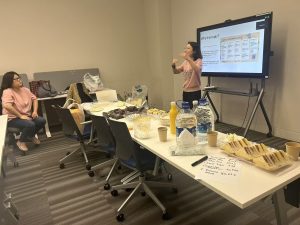
On April 17 2025, DKU faculty, staff, and students convened for our latest reading group session focusing on “Embracing Diversity: Developing Cultural Competence for Inclusive Education.” This session fostered an important dialogue centred on the intersections of disability and LGBTQ+ identities.
The session began with a reflection on the DKU’s recent Disabilities Week, providing context for the ensuing discussion. Participants then engaged with the week’s reading, “Because it’s who I am’: self-determination of LGBTQ adults with intellectual disability”, exploring themes relevant to the experiences of individuals navigating both disability and LGBTQ+ identity.
Facilitated by Dr. Zhenjie Weng and Dr. Yanan Zhao, the conversation covered a range of related topics. Participants discussed current issues surrounding disabilities, including challenges related to ADHD. The discussion then broadened to encompass the experiences of the LGBTQ+ community, specifically considering the unique perspectives and challenges faced by individuals at the intersection of these identities. An important part of the conversation focused on understanding and supporting the partners of individuals with disabilities within the LGBTQ+ context. The group emphasized the need for greater understanding, empathy, and inclusive support systems.
The event was organized by Dr. Zhenjie Weng, Assistant Professor of English Language Education, and Dr. Yanan Zhao, Senior Lecturer of English for Academic Purposes, from the Language and Culture Center, and was sponsored by the Humanities Research Center. Student worker Yaxuan Wang contributed to the planning and success of the event.
Student Report on the Eco-Emancipation Conference
Reported by Cody Schmidt, class of 2025, and Grace Kelly, class of 2025
DKU’s Eco-Emancipation conference gathered international scholars to explore approaches to environmental justice, rights of nature, and themes in human-environment relationality. Through lectures, discussion, and spirited debates, participants imagined liberation beyond modern anthropocentric frameworks.
The Humanities Research Center held a three-day conference titled “Eco-Emancipation: Reimagining Sustainability, Justice, and Liberation” from April 10th to 12th. Hosted by DKU professors Quinlan Bowman and Robin Rodd, the conference brought together a number of scholars—both in-person and virtual—from across the globe to discuss novel ideas concerning the rights of nature, bioculturalism, and the interconnectedness between humans and their environment.
The conference drew its name and themes from a recently published book by Sharon Krause, a professor of political science at Brown University, titled Eco-Emancipation: An Earthly Politics of Freedom. In her book, Krause offers a political framework for environmental justice and argues for greater constraints on domination and exploitation, both regarding humans and what she refers to as the “more-than-human,” topics which were referenced throughout the conference.
 Keynote speaker Robyn Eckersley (University of Melbourne) opened the conference on April 10th with a lecture tracing the history of non-anthropocentric political theories, from early religion-inspired stewardship to modern legislative methods. Eckersley’s address set the stage for the days ahead, followed by an opening reception and a student panel on eco-emancipation and sustainability.
Keynote speaker Robyn Eckersley (University of Melbourne) opened the conference on April 10th with a lecture tracing the history of non-anthropocentric political theories, from early religion-inspired stewardship to modern legislative methods. Eckersley’s address set the stage for the days ahead, followed by an opening reception and a student panel on eco-emancipation and sustainability.
Sharon Krause began the first full day of speakers with an overview and expansion on the themes of her book. Speaking via Zoom, she built upon the need for a non-anthropocentric transition and recognition of nature’s rights through its representation in political systems. Renee Richer (DKU) spoke next, exploring the colonial history of invasive species, followed by Robyn Eckersley, who spoke on the practice of eco-emancipation and its tangible processes and outcomes. Joining virtually, Alf Hornberg (Lund University) discussed the need for humans to reorient their actions and thoughts in response to a rapidly changing biosphere, adapting to match the seriousness of the climate crisis. Lisa Ellis (University of Otago) and Marion Hourdequin (Colorado College), both joining online as well, presented ideas for achieving a post-extractivist, eco-emancipatory world. Ellis analyzed New Zealand’s rights of nature legislation, and Hourdequin argued for the interpretation of certain ethical choices as political. Hans Baer (University of Melbourne) closed this day of lectures with a critique of the aviation industry and its effects on the environment.

The final day began with co-host Robin Rodd detailing biocultural efforts in the Paraguay-Paraná watershed, where a collective of Argentinian activists is creating economic and social empowerment for communities. Miguel Rojas-Sotelo (Duke University) and Isabel Altamirano-Jimenez (University of Alberta) spoke on indigenous cosmologies and associated rejections of anthropocentrism in favor of eco-relationality. Rowan Alcock (Tsinghua University) presented his current project on post-growth values in Chinese communities, primarily through the care of collectives. Eben Kirksey (University of Oxford) spoke on how social inequities and exploitative industry practices shape humans’ vulnerability to viruses, drawing lessons from the COVID-19 pandemic. The conference concluded with co-host Quinlan Bowman’s preview of his forthcoming paper, which interrogates the idea of a societal “overlapping consensus” on eco-emancipation as presented by Krause.
Each talk was followed by a Q&A, during which lively, stimulating debates engaged guest scholars, DKU professors, and students in discussion. The result was a dynamic exchange of ideas from global yet intersecting perspectives, leaving participants eager to continue to reimagine what true sustainability and eco-emancipation might look like.
Student Report: Gambling and Early Modern Vernacular Stories: 馮夢龍 (1574-1646) and Li Yu 李漁 (1611-1680)
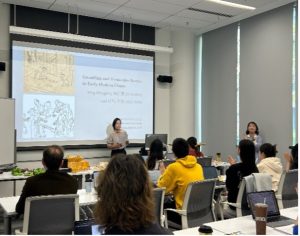
Reported by Yuqing Wang, Class of 2025
On April 16th, Duke Kunshan University had the pleasure of hosting Professor Jiayi Chen from Washington University in St. Louis for a lecture titled Gambling and Early Modern Vernacular Stories: Feng Menglong and Li Yu. Held in CCT E1012, the event attracted around 30 students and faculty members from various disciplines, creating a lively and engaged atmosphere.
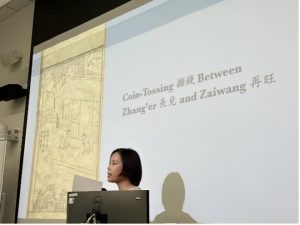
Professor Jiayi Chen focused on two vernacular short stories—“A Trifling Quarrel Over a Penny Leads to an Extraordinary Tragedy” by Feng Menglong and “A Living Person Pays the Gambling Debt for a Ghost” by Li Yu—to explore how gambling functions as a key narrative device. She argued that in the literary context of late Ming and early Qing China, gambling was more than a recreational activity—it became a symbolic structure through which writers explored moral tension, social risk, and the unpredictability of fate. Following the format of simple coin-flipping gamble, a single wager in these stories could lead to dramatic consequences, prompting deeper reflection on opportunity and agency while refraining from giving clear moral teachings.
In addition to textual analysis, Professor Chen introduced various forms of gambling practiced in premodern China, such as dice games, treasure guessing, and betting rituals. These historical examples helped bridge the gap between literary imagination and lived cultural practices, enriching the audience’s understanding of both.
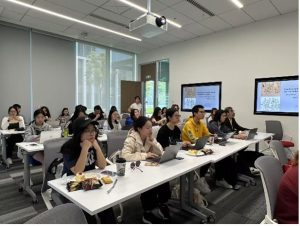
The Q&A session was dynamic and intellectually stimulating. Students raised thoughtful questions about narrative structure, gender representation, and symbolic meaning. Many commented that the lecture helped them see early vernacular fiction—and the role of “games” in literature—in a completely new light. Overall, the lecture offered a nuanced and engaging perspective on how literature and cultural practice intersect, highlighting the complexity and richness of early Chinese storytelling.
Gender and Sexuality Conference: Bridging Scholarship and Community

Reported by Rebecca Combs, Class of 2025
The Humanities Research Center’s 2025 Spring Conference on Gender and Sexuality transformed the second and third floors of DKU’s Academic Building into a vibrant hub of intellectual exchange on April 18-19, 2025, bringing together scholars, faculty, students, and community members from Duke Kunshan University and NYU Shanghai. As one of the HRC’s three focus areas for the year, the conference created a dynamic space for exploring the intersections of gender, sexuality, vulnerability, and resistance through keynote lectures, student panels, passionate round table discussions, and community events.
Keynote Speakers
On the morning of Friday April 18, the conference began with Professor Gabriel N. Rosenberg’s lecture “Hubert Goodale’s Feminized Cockerels: Industrial Chicken Breeding, Sex Control, and the Queer Ecology of Early Twentieth Century Endocrinology,” examining the intersection of animal husbandry, sexuality, and biopolitics. Dr. Rosenberg, an Associate Professor of Gender, Sexuality, and Feminist Studies at Duke University, detailed how poultry geneticist Hubert Goodale’s 1930s experimental grafting of hen ovaries into castrated roosters served as a site of early knowledge pertaining to sex development. His presentation showcased how the emergence of industrial chicken farming influenced endocrinological research, with unexpected “spillover” effects when scientists compared animal and human bodies, revealing the multispecies ecologies underpinning histories of human race, gender, and sexuality.
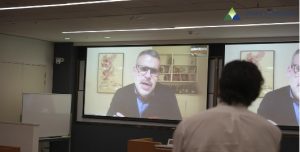
Professor Usha Iyer, Associate Professor of Film and Media Studies at Stanford University, presented “The Sticky Intimacies of Jammin’: Mapping Media Traffic and Femme Performance Repertoires between India and the Caribbean”. Her lecture examined the performative repertoires of female Indian orchestra singer Kanchan and Indo-Caribbean-Canadian drag queen Priyanka, analyzing how these performers navigate race, gender, and regional identities. Drawing from her current book project on Black and Brown media intimacies, Dr. Iyer developed the framework of “jammin'” to map multi-directional, transregional, cross-racial flows and frictions in cultural exchange.
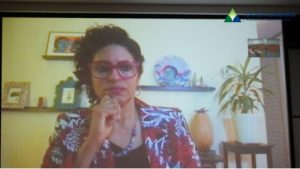
The second day began with the third keynote speaker Professor Yujie Zhu, Associate Professor at the Centre for Heritage and Museum Studies at Australian National University, presenting “From National Memory to Global Justice: Heritage Politics and the Transnational Movement for ‘Comfort Women’.” His lecture examined how museums and memorials in Shanghai, Taipei, and other locations serve as transnational heritage hubs that challenge male-dominated war narratives by centering women’s experiences of trauma and creating spaces for contemporary justice through global memory movements. Much discussion was had surrounding design in the context of museums over the topic of “comfort women” and their remembrance.
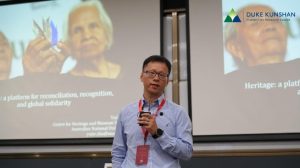
Finally, the conference welcomed fourth keynote speaker, Dr. Ying Zhu, founding editor-in-chief of “Global Storytelling: Journal of Digital and Moving Images” and Professor at the Academy of Film at Hong Kong Baptist University. Dr. Zhu’s presentation titled “Half the Sky and Women’s Programming,” examined how the CCTV program “Half the Sky” emerged amidst the 1995 Beijing Women’s Conference and positioned itself as a unique perspective and compelling piece of media for women’s rights in China. Through her analysis of this state media program, which ended before Xi Jinping’s rise to power, Dr. Zhu explored the relationship between television storytelling, national narrative, and global feminist discourse in China’s political and social transitional period.
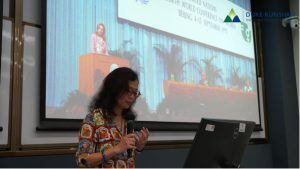
Student research presentations
An impressive array of student scholarship was showcased across twelve panels, creating a rare opportunity for intellectual exchange between DKU and NYU Shanghai students. Topics ranged from studies of “South Korean politics and culture” and “Female communities in China and the diaspora” to “Feminist and queer histories” and “Social media and the metaverse”. Presenters were given ample feedback on their projects from Professors after each talk.
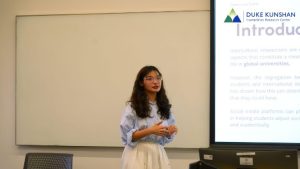
Round table discussions
The conference featured two powerful round table discussions that ignited passionate exchanges among faculty experts. The first, “Anniversary of the 1995 Beijing Conference on Women,” chaired by Carlos Rojas, featured panelists Nellie Chu, Qian Zhu, Yujie Zhu, Usha Iyer, and Gabriel N. Rosenberg reflecting on the 30-year legacy of this landmark event. The discussion touched on MLK’s quote that “the arc of the moral universe is long but it bends towards justice,” while confronting the sobering reality that rights once gained can indeed be taken away, as evidenced by recent rollbacks of reproductive and LGBTQ+ rights.
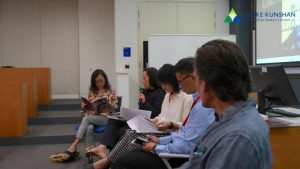
The second round table, “Politics of Gender and Sexuality,” led by Carlos Rojas with panelists Robin Rodd, Kolleen Guy, Titas Chakraborty, and Selina Lai-Henderson, tackled the urgent challenges of rightwing backlash targeting minorities across the globe. As Professor Guy movingly shared, three things have profoundly impacted her life: control over her reproduction, access to education, and feminism—all currently under threat. The discussion created a space for both acknowledging political depression and cultivating hope through collective action, with panelists emphasizing that “empathy can be subversive and resist the toxicness of the world”.
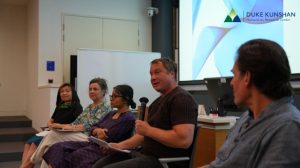
Awards and Publications
The conference concluded with a celebratory awards ceremony honoring six outstanding student papers that exemplified the innovative scholarship within gender and sexuality studies:
- Eva Guo (NYUSH): “Unwritten Queerness: Resisting Western Identity Politics in Queer Asian America”
- Wuyou Wang (NYUSH): “From Dating Apps to Diasporic Queer Community”
- Mingjiang Gao (DKU): “Gay Bear Culture on Chinese Social Media”
- Chengxi Yin (DKU): “Gaining Pleasure in Infinite Game Worlds”
- Philip Yanakiev (DKU): “The Suffering of Women in Times of War”
- Enkhkhuslen Bat-Erdene (DKU): “Women’s Political Empowerment in East Asia”
The event culminated in the exciting launch of the publication “Nexus Global South Journal” as introduced by DKU senior Cody Schmidt and junior Sebastián Portilla. The Lily Pad, or DKU’s premier student-led journal was advertised as well by senior Maya Peak, who revealed a creative design contest would be held for the journal’s front cover. Professor Carlos Rojas also presented the Shanghai Literary Review, inviting students to join as apprentices and continue the scholarly conversations beyond the conference walls.
The Gender and Sexuality Conference embodied the DKU HRC’s commitment to fostering not just interdisciplinary scholarship but also community building across institutions. Through critical engagement with pressing issues of gender, sexuality, and social justice in global contexts, the conference created meaningful spaces for DKU-NYUSH + student-teacher connection and intellectual growth that participants will carry forward into their future work. This event was made possible by the leadership and collaboration amongst DKU HRC Co-directors Professor Selina Lai-Henderson and Professor Carlos Rojas, involved DKU faculty members including Professor Kolleen Guy, Professor Titas Chakraborty, Professor Jay Winters, and the HRC Business Coordinator Fei Xu.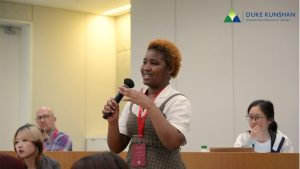
Event Report on Yellowface / Blackface: A Transnational Dialogue
Report by Ruohan Wang, Master of Arts in Asian & Middle Eastern Studies ’26 at Duke University
 On April 4, 2025, the workshop “Yellowface/Blackface: A Transnational Dialogue” was held at the John Hope Franklin Center at Duke University. It was chaired by Carlos Rojas, Professor of Asian and Middle Eastern Studies at Duke and co-director of the DKU Humanities Research Center. Professor Rojas opened with four examples to frame the discussion. The first was Chinese artist Zhang Huan’s 2000 performance The Family Tree, in which he had calligraphers write Chinese characters in black ink across his face, which ultimately darkened into an almost completely black mask. Although intended to affirm Chinese cultural identity, a colleague of Rojas noted its visual resemblance to “blackface.” The second example was a 2013 incident at Duke, where the Kappa Sigma fraternity held an “Asia Prime” party that encouraged stereotypical Asian attire and imagery. The event sparked protests on campus and drew wide criticism. The third example highlighted the contrasting public reactions in 2015 to Caitlyn Jenner’s gender transition and Rachel Dolezal’s racial passing as Black. The fourth example was Rebecca F. Kuang’s 2023 novel Yellowface, which tells the story of a white author who steals the manuscript of a deceased Chinese American writer and publishes it under a fabricated Chinese-sounding name. Following this thread of transnational, transgender, and transracial performance, the workshop featured presentations by Professor Esther Kim Lee, Professor Selina Lai-Henderson, and Professor Kimberly Hassel.
On April 4, 2025, the workshop “Yellowface/Blackface: A Transnational Dialogue” was held at the John Hope Franklin Center at Duke University. It was chaired by Carlos Rojas, Professor of Asian and Middle Eastern Studies at Duke and co-director of the DKU Humanities Research Center. Professor Rojas opened with four examples to frame the discussion. The first was Chinese artist Zhang Huan’s 2000 performance The Family Tree, in which he had calligraphers write Chinese characters in black ink across his face, which ultimately darkened into an almost completely black mask. Although intended to affirm Chinese cultural identity, a colleague of Rojas noted its visual resemblance to “blackface.” The second example was a 2013 incident at Duke, where the Kappa Sigma fraternity held an “Asia Prime” party that encouraged stereotypical Asian attire and imagery. The event sparked protests on campus and drew wide criticism. The third example highlighted the contrasting public reactions in 2015 to Caitlyn Jenner’s gender transition and Rachel Dolezal’s racial passing as Black. The fourth example was Rebecca F. Kuang’s 2023 novel Yellowface, which tells the story of a white author who steals the manuscript of a deceased Chinese American writer and publishes it under a fabricated Chinese-sounding name. Following this thread of transnational, transgender, and transracial performance, the workshop featured presentations by Professor Esther Kim Lee, Professor Selina Lai-Henderson, and Professor Kimberly Hassel.
 The first speaker, Esther Kim Lee, Professor of Theater Studies, International Comparative Studies, and History at Duke University, presented on “The Stage Chinaman and Clown Yellowface,” drawing from the first chapter of her 2022 book Made-Up Asians: Yellowface During the Exclusion Era. She began with an anecdote about 12-year-old Tad Lincoln watching a production of Aladdin on the night of his father’s assassination in 1865. This production included a character named Kazrac, a mute, comic Chinese slave, which Professor Lee identified as an early example of what she termed “clown yellowface,” that is, a racial caricature performed through physical comedy, acrobatics, and exaggerated gestures. Professor Lee argued that the figure of the “stage Chinaman” was not a reaction to Chinese immigration to the United States, but rather a British theatrical invention imported in the early 19th century. She traced its origins to British pantomime, particularly the performances of Joseph Grimaldi, and situated its emergence within a broader imperial context involving the exploitation of Chinese coolie labor. She emphasized that this figure was used to prefigure the Chinese body on stage as comic, strange, and disposable—so much so that, as she powerfully noted, “before Americans ever encountered a real Chinese immigrant, they had already laughed at a fictional one.”
The first speaker, Esther Kim Lee, Professor of Theater Studies, International Comparative Studies, and History at Duke University, presented on “The Stage Chinaman and Clown Yellowface,” drawing from the first chapter of her 2022 book Made-Up Asians: Yellowface During the Exclusion Era. She began with an anecdote about 12-year-old Tad Lincoln watching a production of Aladdin on the night of his father’s assassination in 1865. This production included a character named Kazrac, a mute, comic Chinese slave, which Professor Lee identified as an early example of what she termed “clown yellowface,” that is, a racial caricature performed through physical comedy, acrobatics, and exaggerated gestures. Professor Lee argued that the figure of the “stage Chinaman” was not a reaction to Chinese immigration to the United States, but rather a British theatrical invention imported in the early 19th century. She traced its origins to British pantomime, particularly the performances of Joseph Grimaldi, and situated its emergence within a broader imperial context involving the exploitation of Chinese coolie labor. She emphasized that this figure was used to prefigure the Chinese body on stage as comic, strange, and disposable—so much so that, as she powerfully noted, “before Americans ever encountered a real Chinese immigrant, they had already laughed at a fictional one.”
The second speaker, Selina Lai-Henderson, Associate Professor of American Literature at DKU and co-director of the DKU Humanities Research Center, presented on “What Happens to Uncle Tom in Maoist China?”, drawn from her monograph in progress. Her presentation traced two key moments in the transnational reception of Harriet Beecher Stowe’s Uncle Tom’s Cabin in China: first, in the early 20th century, and later, during the Maoist era. Professor Lai-Henderson noted that the 1901 Chinese translation by Lin Shu and Wei Yi emerged at a time of national crisis. In this context, the novel was read as a political allegory, and the fate of enslaved African Americans became a cautionary tale for the Chinese. In contrast, the 1959 Maoist theatrical adaptation by Ouyang Yuqian radically transformed the story to align with revolutionary ideology. Among the key changes, Professor Lai-Henderson emphasized the re-centering of Uncle Tom, no longer as a Christian martyr but as a figure of revolutionary consciousness that could be mobilized in Maoist China, in alignment with a broader vision of Afro-Asian solidarity. In this way, Professor Lai-Henderson read theatre as a site of evolving Afro-Asian negotiations that allowed for racial crossings. “To look at Blackness, in other words, as an allegory on the stage,” she explained, “is to look at the degree to which Blackness—and also Whiteness—are performed, manipulated, and exhibited by Chinese performers […].”
 The third speaker, Kimberly Hassel, Assistant Professor of Japanese Studies in the Department of Asian and Middle Eastern Studies at Duke University, presented on “Anti-Blackness and (Digital) Yellowface in the Assassin’s Creed: Shadows Controversy,” developed from her co-authored paper “Stranger Than Fiction? Yasuke and the Assassin’s Creed: Shadows Controversy.” Her talk began by detailing the backlash to the release of Assassin’s Creed: Shadows in May 2024, which introduced two protagonists: Naoe, a female Japanese assassin, and Yasuke, a historically documented Black samurai who served under Oda Nobunaga. While critics accused the game of historical inaccuracy, anti-Blackness, misogyny, and ethno-nationalism, Professor Hassel pointed out the selective application of these critiques, especially given the franchise’s long-standing inclusion of supernatural and fictional elements, such as fighting the Pope or Egyptian gods. Moreover, Professor Hassel examined how digital technologies facilitate the circulation of racist rhetoric. She analyzed how machine translation and online anonymity enabled collaboration between far-right Japanese nationalists and international critics, illustrating how digital platforms allow racist ideologies to move fluidly across national and linguistic borders. As she asked pointedly, “Whose imagination decides who could be a samurai or a wizard? Why do some individuals insist that these identities are incongruent with Blackness?” In this way, Professor Hassel’s talk powerfully addressed the complex issue of representability in gaming culture within transracial, transnational, and transmedia contexts.
The third speaker, Kimberly Hassel, Assistant Professor of Japanese Studies in the Department of Asian and Middle Eastern Studies at Duke University, presented on “Anti-Blackness and (Digital) Yellowface in the Assassin’s Creed: Shadows Controversy,” developed from her co-authored paper “Stranger Than Fiction? Yasuke and the Assassin’s Creed: Shadows Controversy.” Her talk began by detailing the backlash to the release of Assassin’s Creed: Shadows in May 2024, which introduced two protagonists: Naoe, a female Japanese assassin, and Yasuke, a historically documented Black samurai who served under Oda Nobunaga. While critics accused the game of historical inaccuracy, anti-Blackness, misogyny, and ethno-nationalism, Professor Hassel pointed out the selective application of these critiques, especially given the franchise’s long-standing inclusion of supernatural and fictional elements, such as fighting the Pope or Egyptian gods. Moreover, Professor Hassel examined how digital technologies facilitate the circulation of racist rhetoric. She analyzed how machine translation and online anonymity enabled collaboration between far-right Japanese nationalists and international critics, illustrating how digital platforms allow racist ideologies to move fluidly across national and linguistic borders. As she asked pointedly, “Whose imagination decides who could be a samurai or a wizard? Why do some individuals insist that these identities are incongruent with Blackness?” In this way, Professor Hassel’s talk powerfully addressed the complex issue of representability in gaming culture within transracial, transnational, and transmedia contexts.
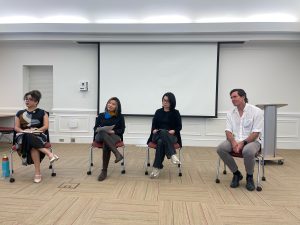 Following the three thought-provoking talks, which spanned over two centuries of cultural history, Professor Rojas initiated a panel discussion by inviting the speakers to reflect on the continuities and shifts in racial performance over time. Professor Lee emphasized the persistent nature of racial power structures, arguing that the logic of race has remained largely unchanged since the 19th century. Professor Lai-Henderson focused on the Afro-Asian contexts and addressed evolving attitudes toward Blackness in Chinese performances and everyday lives. Professor Hassel turned to the digital sphere, examining how online platforms have opened up new spaces for both racial discourse and discrimination. The conversation then opened to a lively audience Q&A, during which several probing questions extended the panel’s themes to issues of corporate interests and capitalist logic, media representation, and the ethical dimensions of racial performance. The workshop concluded with a sense of ongoing dialogue, as both panelists and audience (re)acknowledged the enduring complexity of racial representation across time and affirmed the need for continued critical engagement with these issues.
Following the three thought-provoking talks, which spanned over two centuries of cultural history, Professor Rojas initiated a panel discussion by inviting the speakers to reflect on the continuities and shifts in racial performance over time. Professor Lee emphasized the persistent nature of racial power structures, arguing that the logic of race has remained largely unchanged since the 19th century. Professor Lai-Henderson focused on the Afro-Asian contexts and addressed evolving attitudes toward Blackness in Chinese performances and everyday lives. Professor Hassel turned to the digital sphere, examining how online platforms have opened up new spaces for both racial discourse and discrimination. The conversation then opened to a lively audience Q&A, during which several probing questions extended the panel’s themes to issues of corporate interests and capitalist logic, media representation, and the ethical dimensions of racial performance. The workshop concluded with a sense of ongoing dialogue, as both panelists and audience (re)acknowledged the enduring complexity of racial representation across time and affirmed the need for continued critical engagement with these issues.
Student Report :”Cultivating Affinity: Evolving Engagements of Chinese Buddhism in East Africa”
Reported by Xinyu Liao, Class of 2027
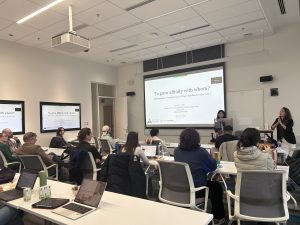 On March 31, 2025, DKU welcomed Dr. Yu Qiu for an insightful workshop and talk that explored the complexities of China-Africa encounters through an anthropological lens. The intimate gathering of approximately 15 participants provided an ideal setting for deep engagement with Dr. Qiu’s research on migration, ethics, and identity politics. As a social anthropologist from Zhejiang University, Dr. Qiu has extensive fieldwork experience across Nigeria, Tanzania, and China. She brought unique perspectives on how cultural interactions unfold in transnational spaces, challenging conventional understandings of cross-cultural encounters.
On March 31, 2025, DKU welcomed Dr. Yu Qiu for an insightful workshop and talk that explored the complexities of China-Africa encounters through an anthropological lens. The intimate gathering of approximately 15 participants provided an ideal setting for deep engagement with Dr. Qiu’s research on migration, ethics, and identity politics. As a social anthropologist from Zhejiang University, Dr. Qiu has extensive fieldwork experience across Nigeria, Tanzania, and China. She brought unique perspectives on how cultural interactions unfold in transnational spaces, challenging conventional understandings of cross-cultural encounters.
The workshop portion began with Dr. Qiu’s critical examination of how anthropologists conceptualize “encounters.” She argued that traditional frameworks often treat these interactions as static moments rather than dynamic processes shaped by power and mobility. Such a theoretical discussion came alive through her vivid ethnographic accounts of Nigerian migrants in Guangzhou, particularly their complex relationships with Chinese partners. These “semi-kinship” arrangements, existing outside formal legal recognition, revealed how intimacy and economics intertwine in migrant communities. A particularly powerful moment came when Dr. Qiu shared a late-night fieldwork encounter where a Nigerian community leader tested her ethical boundaries with a provocative hypothetical question about harassment. It led naturally into a discussion of feminist anthropology, where Dr. Qiu balanced the need to acknowledge structural inequalities with the importance of maintaining ethnographic openness to complex social realities.
 Transitioning to her talk on Chinese Buddhism in Tanzania, Dr. Qiu presented fascinating findings about China mainland’s first Buddhist monastery in Africa. Unlike traditional missionary approaches, this “humanistic Buddhist” project emphasized social engagement over conversion, employing innovative strategies like labor-exchange volunteer programs and Mandarin classes. However, Dr. Qiu’s nuanced analysis revealed how these well-intentioned efforts sometimes reproduced colonial power dynamics, with Chinese donors viewing Tanzanian participants more as laborers than spiritual equals. The language barrier created by Mandarin instruction further complicated the monastery’s outreach, while local Tanzanians developed their own interpretations of Buddhism – some seeing it through the lens of colonial history, others as economic opportunity. These contradictions highlighted the complex interplay between religious transmission, cultural adaptation, and power relations in transnational spaces.
Transitioning to her talk on Chinese Buddhism in Tanzania, Dr. Qiu presented fascinating findings about China mainland’s first Buddhist monastery in Africa. Unlike traditional missionary approaches, this “humanistic Buddhist” project emphasized social engagement over conversion, employing innovative strategies like labor-exchange volunteer programs and Mandarin classes. However, Dr. Qiu’s nuanced analysis revealed how these well-intentioned efforts sometimes reproduced colonial power dynamics, with Chinese donors viewing Tanzanian participants more as laborers than spiritual equals. The language barrier created by Mandarin instruction further complicated the monastery’s outreach, while local Tanzanians developed their own interpretations of Buddhism – some seeing it through the lens of colonial history, others as economic opportunity. These contradictions highlighted the complex interplay between religious transmission, cultural adaptation, and power relations in transnational spaces.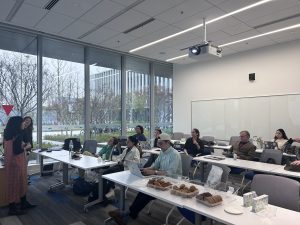
The Q&A session fostered lively exchanges about the practical and ethical dimensions of Dr. Qiu’s research. Participants pressed on important questions about maintaining researcher safety while building trust in marginalized communities, the evolving nature of religious practices as they cross cultures, and the role of language in facilitating or hindering genuine intercultural exchange. Dr. Qiu emphasized that no encounter happens in a vacuum – each interaction carries historical baggage and operates within existing power structures, even as individuals exercise agency in unexpected ways. These discussions revealed how Dr. Qiu’s work pushes beyond simplistic narratives of “soft power” to show the grassroots complexities of China’s global engagements.
In conclusion, the event offered profound insights into the messy realities of cross-cultural encounters that often get smoothed over in broader narratives about globalization. Dr. Qiu’s research demonstrates how religious, economic, and social motivations become deeply entangled in transnational spaces, requiring research approaches that are equally nuanced and adaptive. The workshop’s intimate format allowed for particularly meaningful engagement with these ideas, leaving participants with both a deeper understanding of China-Africa interactions and a renewed appreciation for the value of ethnographic methods. Ultimately, Dr. Qiu’s work reminds us that the most significant cultural exchanges often happen in everyday spaces where people negotiate identity and belonging – spaces that demand our careful attention and reflexive engagement as researchers and global citizens.